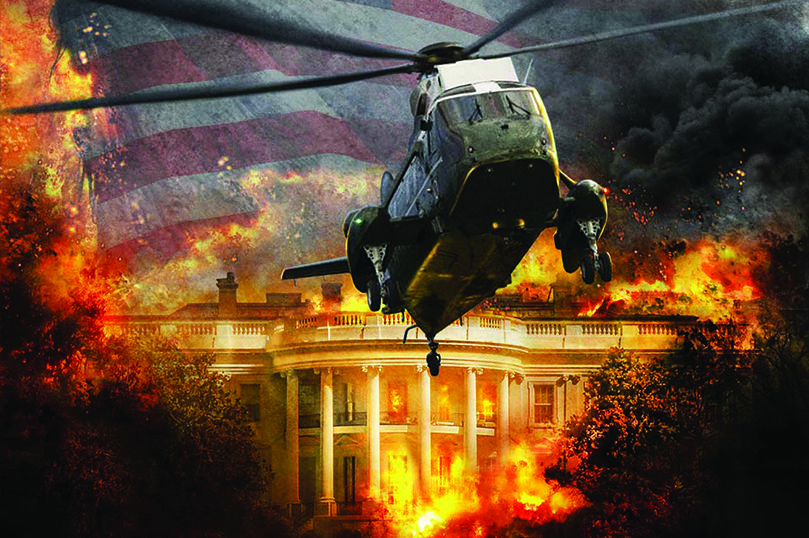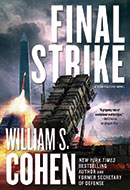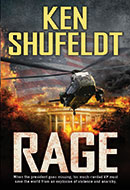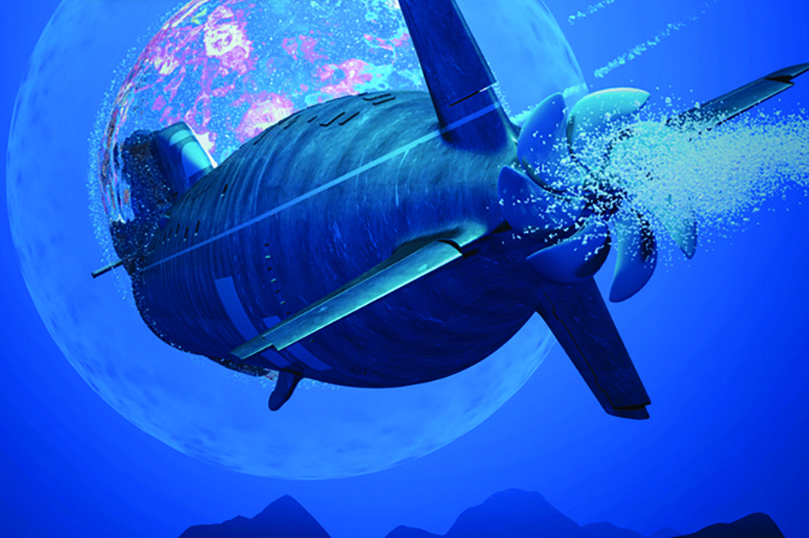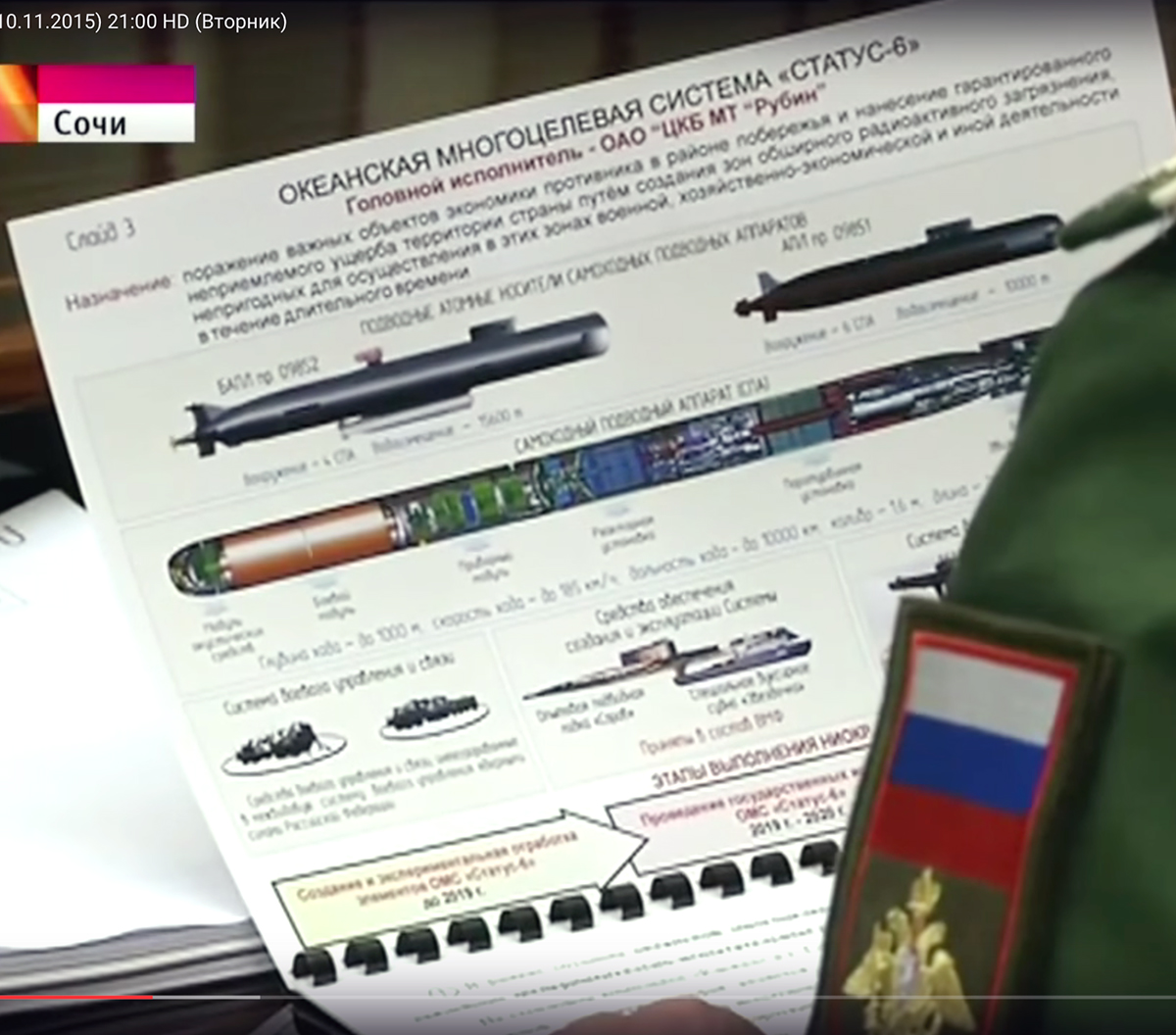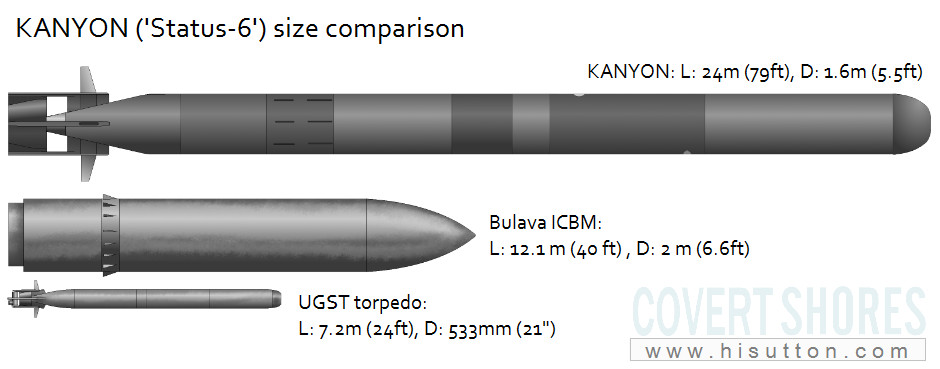




 Jerry Mitchell, now the commodore of submarine Development Squadron Five, is dismayed when USS Toledo is reported missing in Arctic waters, close to Russian territory. The vessel is captained by his former shipmate and close friend, Lenny Berg. Eager to investigate, Jerry convinces the Navy to redirect one of his squadron’s boats to find out what happened.
Jerry Mitchell, now the commodore of submarine Development Squadron Five, is dismayed when USS Toledo is reported missing in Arctic waters, close to Russian territory. The vessel is captained by his former shipmate and close friend, Lenny Berg. Eager to investigate, Jerry convinces the Navy to redirect one of his squadron’s boats to find out what happened.
It turns out Toledo was sunk just outside of Russian territorial waters by a torpedo launched from a naval mine. Even more disturbing is the discovery that Russia is building a deadly weapon. Engineers have modified the STATUS-6, a strategic nuclear-propelled, nuclear armed torpedo that is already operational, into a stealthy first strike weapon: Drakon. This new tool would allow the Russians to launch a completely covert nuclear decapitation strike on the USA.
The new Russian president has plans for Europe, and is more than willing to use nuclear blackmail—or an actual attack—to keep the Americans from interfering. To avoid a Russian war in Europe, and a nuclear catastrophe at home, Mitchell must find a way to destroy the Drakon launcher before it’s too late.
Arctic Gambit will be available on May 29th. Please enjoy this excerpt, and continue reading on Criminal Element!
1: Phone Call
11 June 2021
0440 Pacific Daylight Time
Bangor, Washington
Emily felt Jerry’s body tense, and she came fully awake. He was sitting up, rigid, listening to the phone.
Small-hours phone calls were hardly worth mentioning in the Mitchell home. Jerry had given his staff a fair-sized list of situations that required contacting the squadron commander immediately, regardless of the hour. She usually slept straight through them. Most were just a notification, or a simple question. Jerry would say a few words, hang up, and go back to sleep himself.
But this time, he listened and asked quick, short questions. If his body language hadn’t alerted her, his tone would have—softly spoken, but intense, and Emily knew enough about submariners to become more concerned the longer he spoke.
“How long?” then, “Who has been notified?”
After a long pause, he added, “Yes, go ahead, but I’m coming in anyway. Tell the driver I’ll be ready in fifteen. Good work, Myron.” Jerry set the phone down, then turned to Emily.
“It was Myron Wheatly,” he explained softly, because four-year-old Charlotte was sprawled between them, thankfully still sound asleep. LCDR Wheatly was the squadron maintenance officer, and the command duty officer that night. “We got a call from SUBRON Twelve in Groton. Toledo has missed her last three communications windows.”
Alarm flashed through her, and she had to remember to whisper. “Lenny Berg’s boat? It’s overdue?”
“Not officially,” he cautioned. “That won’t be until it’s due back at base, several weeks from now.”
“But does Jane . . .”
Charlotte stirred, stopping Emily in midsentence. Jerry took the opportunity to smoothly disengage from the little girl’s arm and ease himself out of bed. He’d heard the concern in his wife’s voice, and came around to her side of the bed, kneeling down next to her head to whisper.
“There are a lot of reasons she could be out of comms, and SUBRON Twelve is already working the problem. They called me because Captain Dorr knows Lenny’s a good friend of ours. I’m going in so I can get a classified briefing, and to make sure Myron didn’t miss anything.”
Emily nodded. Time to be the commodore’s wife. “I can get Charlotte to daycare, no prob,” she added. Sometimes she rode with daddy to the base’s daycare, but not at 0440. “And this is still classified,” she stated, although it was really a question.
“Tippy-top,” Jerry confirmed as he got dressed. “But not officially. They’re just keeping the information close-hold to avoid worrying the families. They won’t even tell the other boats in Squadron Twelve until it’s necessary. Hopefully, it won’t be.”
Long practice helped Jerry get downstairs and outside just as the duty driver arrived. As he got in, Logistics Specialist Second Class Matthews reached back and handed Jerry a printout. “Commodore, Mr. Wheatly said you’d want to see this, and there’s a travel mug of coffee in the cup holder next to you.”
“Bless you, Petty Officer Matthews,” Jerry answered, taking the document and placing it in his lap. Reaching for the coffee with one hand while turning on a small reading light with the other, he saw that the document was a timeline of USS Toledo’s patrol, and now search. The last transmission from her was four days ago.
He frowned, feeling guilty about lying to Emily. Well, not exactly lying, but he hadn’t told her that the navy’s standard procedure after a sub missed two comm windows was to send out a priority message, “You OK? Please respond.” The balloon officially went up when the deadline for an answer to that call had passed. That had been at 0700 this morning, eastern time, hence the predawn call to Jerry.
The part of Jerry still waking up groused that they could have waited another few hours to call, but the people on SUBRON 12’s staff knew that Lenny and Jerry had been shipmates and close friends ever since they served together on Memphis. How many years ago? He and Emily were godparents to Lenny and Jane’s oldest boy, Ethan. While Jerry’s star had risen a little faster than his friend’s, he was sure that after Lenny finished his command tour on Toledo, he would be moving up.
They were right to call, whatever the hour. Jerry’s squadron, Submarine Development Squadron Five, controlled three boats, all fitted with advanced technology that might someday be fitted to the rest of the submarine fleet, or unique equipment that would allow a sub to perform a difficult, very specialized task, such as retrieving large heavy objects from the ocean floor, or carrying underwater robots for scouting. If any of that gear could help find Toledo, or save her if she was in trouble, he didn’t want to waste a minute.
Jerry desperately hoped that some circumstance or combination of circumstances had prevented Toledo from communicating, although it was hard to imagine what that could be. Subs had more than one way of phoning home, and sub sailors were pretty creative.
Thinking about Lenny and their days serving together aboard USS Memphis made him think about Memphis’s captain, then Commander Lowell Hardy. Their skipper had also moved on and up since that cruise. Jerry had the urge to call Hardy. Not to tell him about Lenny. He’d already know. Just to talk and share their worries. But you can’t just phone the president of the United States.
11 June 2021
0935 Eastern Daylight Time
The Pentagon
Arlington, Virginia
“He’s agreed to let SUBFOR and SUBRON Twelve handle the search, at least for now.” Commander Russ Chatham was on the CNO’s intelligence staff. He leaned back in his chair, visibly relieved.
Rear Admiral Mike Sanders, Chatham’s boss, smiled. “How was your first time briefing the president?”
Chatham just shook his head. “A typical nuke. He wanted to know everything. Thanks for warning me.”
Sanders’s smile widened. “Bitter experience, Rusty. You don’t get a pass from Hardy because you’re an aviator.”
“He knows as much about Toledo’s status, and Tensor, as anyone in the Navy right now. I could tell he wanted to ask more questions, or tell us to do something else, but he knew there was nothing else to learn, and we were already doing everything we could.”
“With any other politician, you would have lost an hour explaining why adding more searchers wouldn’t help, or why we haven’t already announced her as overdue.”
Rusty countered, “But he still wants updates twice a day, and immediate word if something new pops up.”
Admiral Sanders replied, “And hopefully it’ll be good news. In which case this just becomes part of Toledo’s patrol report, and no fuss. If we do declare her overdue, with the search area right next to Russian waters, too many questions will be asked about why we were there. It’s not a normal patrol zone. The last thing we want to do is draw anyone’s attention to Tensor.” Even in a very secure space, Sanders used the code word for the intelligence target, rather than its name.
“Since the location of our patrol zones are classified, we could just say it was a routine patrol zone, and only the Navy’s head shed would know we were lying.”
“The Russians have at least a general idea of where we normally operate. They would know,” Sanders argued. “And nothing we say will prevent them from raising a very public fuss about operating so close to their waters.”
“A lot of good it will do them.” Rusty grinned. “Hardy doesn’t put up with that crap.”
Sanders nodded and returned the grin. “I voted for him, too.”
15 May 2019
2330 Eastern Daylight Time
Georgetown, Washington, D.C.
“Let it go, dear.”
Senator Lowell Hardy (D-CT) looked up from his newspaper. His wife, Joanna, lay next to him. They made a habit of reading together each night before they slept. For both of them, spending quiet time next to the most important person in their life was more than beneficial.
“I could hear your teeth grinding,” she explained. “It’s not worth the aggravation.”
“I do not grind my teeth,” Hardy protested firmly.
“No you don’t. Well, at least not physically anyway,” she said, smiling, “but you mutter and grumble any time you’re reading something that upsets you, and we’re supposed to be unwinding.” She leaned over to look at the page. “I knew it! Another article on the primaries.”
Hardy held the paper up in one hand, as if displaying evidence. “Walters is a moron. I learned more about economics at the academy than he did heading that committee. And that ‘White Paper’ on the military he’s released is a piece of bovine excrement!”
“He’s got to get his name out there, after all, dear. It’s how the system works.”
“Is this really the best the Democratic Party can do? And Walters is the favorite! The others are even worse! Would you divorce me if I voted Republican this time around?”
She shook head but smiled. “No, but you might want to buy a comfortable couch.”
“I hear what passes for thoughtful policy in this town and I’m appalled. Reality doesn’t stand a chance against ideology and political convenience. If I thought I had an ice cube’s chance in blast furnace . . .”
“ . . . I’d run myself,” she completed. She leaned over and kissed him. “You’ve been saying that a lot lately. Be careful what you wish for.” Turning around, she leaned over and opened the drawer on the nightstand by the bed. After some rustling, she pulled out a manila folder. “I’ve done a little research, and called a few friends.” She opened the folder and withdrew a handwritten note. “Here, read this.”
Hardy put the newspaper aside and fiddled with the reading light before focusing on the single half-sized sheet of paper. The letterhead leapt off the page. It read simply, “The White House,” with the presidential seal embossed in gold over the letters.
Joanna,
I think your idea is an excellent one, and if Lowell ever decides to run, tell him he will have my full support. Better yet, see if you can bring him around to that idea. I know he will do a great job sitting in my chair.
Kenneth L. Myles
It didn’t take long to read, and Hardy read it at least twice more before noting the date. “This is over a year ago!” he exclaimed.
“Here’s another one, it’s a little more recent,” she said smoothly, “from President Huber.”
He started to speak, but she cut him off. “I waited until you’d made your feelings clear. I feel the same way—in fact, I think you’d make a great president, and I’ve thought so for some time.”
“But these notes . . .” he protested.
“Only three people know about each of these notes, and two of them are in this room. I’ve also sounded out other friends in the party and outside, always privately: ‘What if?’ Their universal reaction was ‘Yes!’ and ‘What’s holding him back?’”
She pointed to the folder. “I’ve sketched out a rough campaign organization.” Then grabbing his hand firmly said, “Lowell, you have more than just a chance. You could win. Seriously.”
“I feel a little like I’m being railroaded,” he mused.
She made a dismissive gesture. “You’re too damn sensible, too practical to ever say, ‘I want to be president.’ It’s my job as the objective observer in this household to point out the opportunity.”
Hardy laughed. “You’re not very objective, or unbiased in this case, my love.”
“No, I’m not,” she acknowledged, smiling, “but I’ve got thirty-plus years experience in this town, and I’ve worked directly for two presidents. You’ve made a lot of friends here, and more importantly, you’re highly respected—even by those who disagree with you. And you’re right. Walters is too focused on jobs, Mendoza’s too inexperienced, and nobody can figure out why Pickering is running.”
She laid a hand on his arm, reassuring him. “You can stop the train and get off any time you like. I can put this folder back in the drawer. It will still be good four or eight years from now, but you can run—and win—right now.”
She watched his expression, or rather expressions, as he considered what might be the most important decision of his life. She knew what he would do, though. Lowell had never turned away from a job that needed to be done, regardless of how long it took or tough it might be.
He held out his hand. “Let me see what you’ve got in there.”
22 June 2020
0940 Eastern Daylight Time
Columbus, Ohio
CNN Coverage of the Democratic Party Convention
“And that was really the last challenge to Senator Hardy’s chances of winning the nomination. Waiting until this late date to choose a running mate was risky, but my sources tell me that the deal that allowed Mendoza to accept the VP slot was not finalized until very late last night.”
“Literally at the eleventh hour,” another commentator supplied. “But it really had come down to only Mendoza and Hardy, especially after Pickering’s campaign imploded and Walters did so badly in the debates.”
The woman anchor nodded her head and added, “The lack of any baggage didn’t hurt Hardy, either. Both Walters and Pickering spent a lot of time on the defensive, attempting to justify their far left–leaning positions to a skeptical electorate. With Hardy’s highly successful terms in both the House and Senate as a centrist, and Mendoza’s one in the House, balance has become a virtue.”
“But now with Mendoza’s more progressive portfolio on jobs and immigration added to Hardy’s strengths on national security, foreign policy, and the environment, he stands a good chance to win the presidency this November.”
Jerry stared at the TV, half listening to the two commentators, and half struggling to come to grips with what was transpiring. It was all too surreal. His former skipper, friend, and mentor had just won the Democratic Party’s presidential nomination . . . What the hell just happened? he asked himself, again.
Emily literally bounced with excitement beside him; she clearly was enthused by the prospect of their good friends taking up residence in the White House. “Jerry, isn’t this marvelous! Lowell will be a fantastic president! It’s a shame that Carly is too young to understand the honor of having the president and first lady as her godparents.” She stroked the sleeping toddler’s hair as she spoke, beaming with pride.
Emily’s highlighting of the close relationship the two families shared caused Jerry to close his eyes and lean his head back on the couch. He didn’t dare say what his inside voice was screaming, instead he merely pointed out the obvious. “It’s a bit premature to schedule Christmas dinner at the White House, Emily. Lowell still has to win the general election.”
An annoyed frown popped on her face. “Why are you so negative, Jerry? Lowell has far more experience than Crenshaw and is definitely more levelheaded. I don’t understand why you’re not thrilled for him and Joanna. Don’t you want him to be president?”
There was no winning this presidential debate. Sighing quietly, he tried to keep his voice level. “Of course, I want to see Lowell become president, Emily, and yes, he most definitely has my vote. But, there will be professional complications with that outcome.”
The frown melted away; she understood. “You’re still having issues with your reputation, aren’t you? People still believe you enjoy undeserved political favor, even after all you’ve done?”
Jerry nodded. “A month doesn’t go by that I don’t hear at least one offhanded comment from some general officer at the five-sided funny farm. My boss, and the other submariners, know better and are really supportive, but it still bothers me—maybe more than it should. I just can’t see how things wouldn’t get worse if Lowell is elected president, and I think it’s very likely he will be. Being close to a sitting president has been difficult for my superiors and me. Can you imagine the strain Lowell’s election will create? It’s not like we’ve been hiding the close bonds we have with him and Joanna.”
Standing, he reached for the sleeping child in Emily’s lap. “In a way, I’m glad we’ll be moving to Bangor before the election. I need to get away from all this bureaucracy and politics, and back to where I belong . . . back to the boats.”
20 January 2021
1950 Eastern Standard Time
The Watergate Hotel
Washington, D.C.
A knock on the suite’s door interrupted the aide. Jenny opened the door and a dark-suited Secret Service agent reported, “Mr. President, we’re ready to move.”
Lowell Hardy, dressed in what was becoming an all-too-familiar tuxedo, called, “Joanna, it’s time.”
She swept into the room in a green-and-silver designer gown that almost reached the floor. They’d done things with her hair, still red but mixed with gray, piling up and holding it in place with small ornaments that matched her dress.
“Oh my. Wow!” Hardy clapped appreciatively. “Why did I even bother to put on a tuxedo? Nobody’s going to be looking at me.”
“Mr. President, Dr. Patterson, we really must proceed,” the agent insisted. They were scheduled to personally attend a total of ten official inaugural balls that night, and there were over a hundred unofficial balls and other celebrations happening in Washington. Even the president had to allow for what would be crazy traffic.
Reflexively, Hardy checked for his car keys and cell phone, then stopped himself. He wouldn’t need either of those for the next four years. At least he still had a handkerchief.
“We’ll finish that message in the car, Jenny,” he instructed. There were reports of troop movements near the Estonian border, and while there was no imminent threat, it was likely the Russians were getting ready to test the new administration. In between dances, he’d work.
14 June 2021
1800 Pacific Daylight Time
Bangor, Washington
It wasn’t Jerry’s preferred option, but in the end, he did talk to the president, although it was Hardy who called him. Jerry was still at the squadron offices when the call came from Dwight Sellers, Hardy’s Chief of Staff. “The President would like to speak with you in about five minutes.”
“I’ll be standing by,” Jerry answered. Sellers hadn’t bothered to ask if he would be available. The chief of staff’s tone implied that he was on a tight schedule, and so was the president.
Reflexively, Jerry sat up straighter and started neatening up his desk. He paused, laughing at his actions, then shrugged and continued. His desk was pretty messy. Besides, it gave him something to do.
The secure phone finally rang, and Jerry forced himself to wait for the second ring before picking it up. “Commodore Mitchell.”
“Jerry, how’s Emily? How’s my goddaughter?”
“Charlotte just turned four, and Emily already wants her to take ballet lessons.” He didn’t sound happy.
“But she’ll look so cute in that outfit. Every little girl wants to be a ballerina,” Hardy argued.
“Have you been talking to Emily, again, Mr. President? I’m not hearing a lot of support on my end,” Jerry said. Hardy laughed.
“A wise general chooses his battles carefully,” Hardy quoted. “You’re going to lose this one. Just like I always lost whenever you pushed an idea. And before you ask, yes, the SecDef and the rest of your chain of command knows we’re speaking. I told the CNO I needed to hear your reasons straight from you, not third or fourth hand.”
That was why Hardy had taken the time to call. Jerry got straight to the point. “Jimmy Carter is the best boat in the Navy for this kind of work. She’s a full generation ahead of what Seawolf had on board when we went looking for Severodvinsk so many years ago.”
Hardy said, “They briefed me on Jimmy Carter’s status, of course. She’s been out running around the Arctic for over two months already. Do you have a plan to get her resupplied?”
“Absolutely, Skipper,” Jerry replied using Hardy’s old title. “But you’re not sure if you should send her?” he prompted.
Hardy sighed. “Your logic is sound, Jerry, and I want to know what happened to Lenny as much as you do, but Jimmy Carter is a valuable, even unique, national intelligence asset. I know you read her last patrol report, so you’re well aware of the kind of work she’s doing for us. She earned another Presidential Unit Citation from that mission.
“What do we miss by having her do this job, instead?” Hardy continued. “And we can’t afford to lose another boat, especially her.”
Jerry understood immediately. The president was asking “Big Picture” questions, things possibly more important long term than solving the mystery of a lost submarine.
“Mr. President, Jimmy Carter is conducting weapons experiments right now and has all the equipment on board to do a detailed search—she doesn’t have to return to base. We’ll have a Coast Guard icebreaker with a special navy detachment bring her the supplies she’ll need, and she can head straight to Toledo’s last known location. Carter is used to getting in and out of sensitive areas. She can do it quickly, quietly, and by having her cross over the Arctic Circle, we deny the Russians any intel that she is even being sent to poke around their backyard. She can figure out what the hell happened without the Russians ever knowing she was there.”
“That last part is more important than you know,” Hardy remarked. “The borscht is bubbling quite enough as it is. We don’t need to add any more heat to the fire.”
The president paused briefly. “That’s it, then. Get her there as fast as you can, Jerry. We’ll transfer operational control to SUBRON Twelve for the duration of the mission. You’ll get orders through the chain very soon. Tell Captain Weiss I said Godspeed.”
“I will, Skipper. And good luck to you as well.”
“Thanks, Jerry.” Hardy broke the connection and Jerry glanced at the clock. He had some phone calls to make. It was 1815, but his staff’s working day was not going to be over any time soon.
Copyright © 2018 by Larry Bond
Order Your Copy





 Jerry Mitchell, now the commodore of submarine Development Squadron Five, is dismayed when USS Toledo is reported missing in Arctic waters, close to Russian territory. The vessel is captained by his former shipmate and close friend, Lenny Berg. Eager to investigate, Jerry convinces the Navy to redirect one of his squadron’s boats to find out what happened.
Jerry Mitchell, now the commodore of submarine Development Squadron Five, is dismayed when USS Toledo is reported missing in Arctic waters, close to Russian territory. The vessel is captained by his former shipmate and close friend, Lenny Berg. Eager to investigate, Jerry convinces the Navy to redirect one of his squadron’s boats to find out what happened.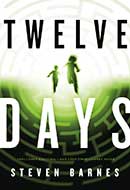 Around the world, leaders and notorious criminals alike are mysteriously dying. A terrorist group promises a series of deaths within two months. And against the backdrop of the apocalypse, the lives of a small shattered family and a broken soldier are transformed in the bustling city of Atlanta.
Around the world, leaders and notorious criminals alike are mysteriously dying. A terrorist group promises a series of deaths within two months. And against the backdrop of the apocalypse, the lives of a small shattered family and a broken soldier are transformed in the bustling city of Atlanta. Victor and Eli started out as college roommates—brilliant, arrogant, lonely boys who recognized the same sharpness and ambition in each other. In their senior year, a shared research interest in adrenaline, near-death experiences, and seemingly supernatural events reveals an intriguing possibility: that under the right conditions, someone could develop extraordinary abilities. But when their thesis moves from the academic to the experimental, things go horribly wrong.
Victor and Eli started out as college roommates—brilliant, arrogant, lonely boys who recognized the same sharpness and ambition in each other. In their senior year, a shared research interest in adrenaline, near-death experiences, and seemingly supernatural events reveals an intriguing possibility: that under the right conditions, someone could develop extraordinary abilities. But when their thesis moves from the academic to the experimental, things go horribly wrong.

